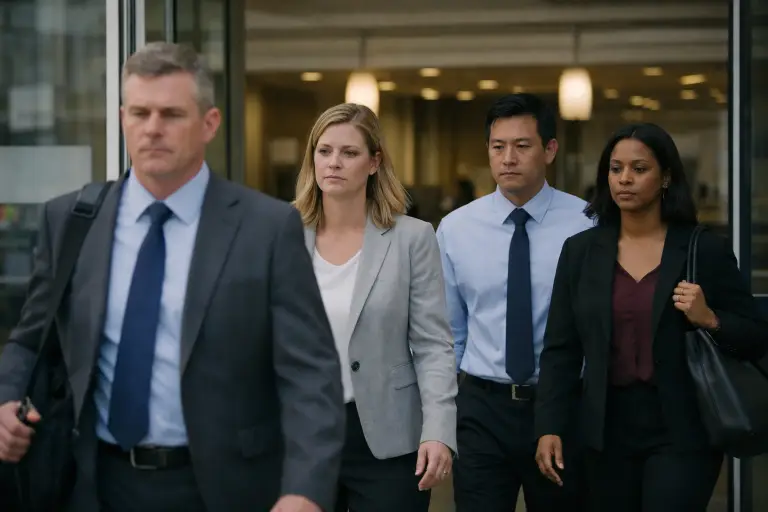Government contractor background checks examine your criminal history, financial responsibility, drug use, employment verification, and personal conduct to determine security clearance eligibility. While factors like felony convictions, serious financial delinquencies, recent illegal drug use, falsification of application materials, and patterns of irresponsible behavior can disqualify candidates, adjudicators evaluate each case using the "whole person concept" rather than applying automatic disqualifications.
Key Takeaways
- Criminal convictions don't automatically disqualify you—adjudicators consider the nature, severity, recency, and your rehabilitation efforts when evaluating eligibility.
- Financial problems like bankruptcy or delinquent debts raise concerns about vulnerability to bribery, but demonstrating repayment plans and financial counseling can mitigate these issues.
- Lying or omitting information on your background check application is more disqualifying than most underlying issues you might be trying to hide.
- Recent illegal drug use (typically within the past year) presents more challenges than past experimentation that you honestly disclose.
- Most government contractor positions require Secret or Top Secret clearance, each with different scrutiny levels and disqualification thresholds.
- Adjudicators use the "whole person concept" to evaluate 13 specific guidelines rather than applying automatic disqualifications for most issues.
- Successful mitigation involves demonstrating time passage, behavioral changes, rehabilitation, and taking responsibility for past mistakes.
- If initially denied clearance, you have appeal rights and can reapply after addressing the concerns that led to disqualification.
Understanding Government Contractor Background Checks
Government contractor background checks differ significantly from standard employment screenings. They evaluate your suitability for accessing classified information or working in sensitive positions. These investigations range from basic suitability checks for low-level positions to extensive Top Secret clearances requiring interviews with friends, family, and former associates.
The depth of investigation depends on the clearance level required for your position. Public Trust positions undergo the least intensive review, examining basic criminal history and employment verification. Secret clearances require more comprehensive investigation including credit checks, reference interviews, and seven years of background history. Top Secret clearances involve the most thorough examination, including interviews with personal references, neighbors, and extensive financial scrutiny covering ten years of history.
Understanding what investigators actually look for helps you prepare appropriately. The adjudication process isn't about finding perfect candidates. It's about identifying trustworthy individuals who don't present unacceptable security risks.
Criminal History That Raises Red Flags
Felony Convictions and Serious Crimes
Felony convictions don't automatically disqualify you from government contractor work. However, they require significant mitigation depending on the crime's nature and recency. Crimes involving violence, dishonesty, national security violations, or moral turpitude create the most substantial obstacles to clearance approval.
Adjudicators particularly scrutinize certain types of convictions:
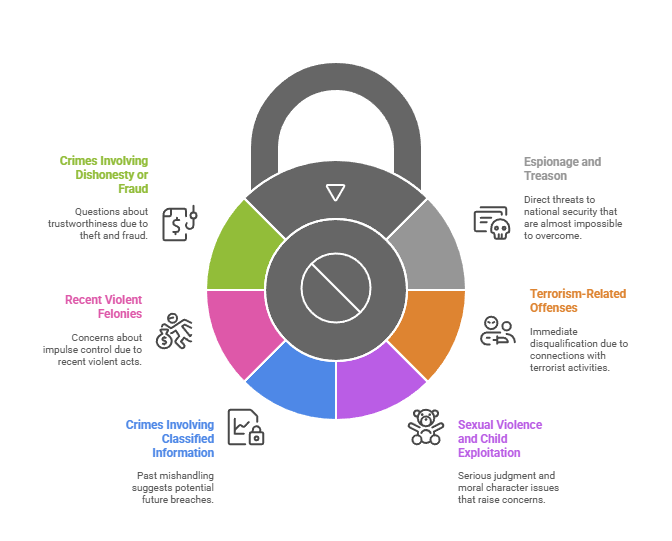
- Espionage and treason: These offenses directly threaten national security and create nearly insurmountable obstacles to clearance approval.
- Terrorism-related offenses: Any connection to terrorist organizations or activities raises immediate disqualification concerns.
- Sexual violence and child exploitation: These crimes demonstrate serious judgment problems and moral character issues that concern adjudicators.
- Crimes involving classified information: Mishandling sensitive information in the past suggests you may do so again.
- Recent violent felonies: Convictions within the past 5-7 years for assault, robbery, or weapons offenses raise serious concerns about impulse control.
- Crimes involving dishonesty or fraud: Theft, embezzlement, identity theft, or fraud directly question your trustworthiness.
The timeframe since conviction matters considerably in the evaluation process. A single non-violent felony from 10-15 years ago with no subsequent legal issues presents far fewer concerns than multiple misdemeanors within the past three years.
Misdemeanors and Lesser Offenses
Misdemeanor convictions typically present fewer obstacles than felonies. However, patterns of repeated offenses raise serious concerns about judgment and reliability. A single DUI from five years ago with completed treatment and no subsequent alcohol-related incidents usually won't disqualify you.
Three DUIs within the past four years demonstrate a different pattern. This shows ongoing substance abuse problems and poor decision-making that adjudicators view unfavorably. Investigators evaluate misdemeanor patterns to identify concerning behaviors.
Several types of misdemeanors raise particular concerns:
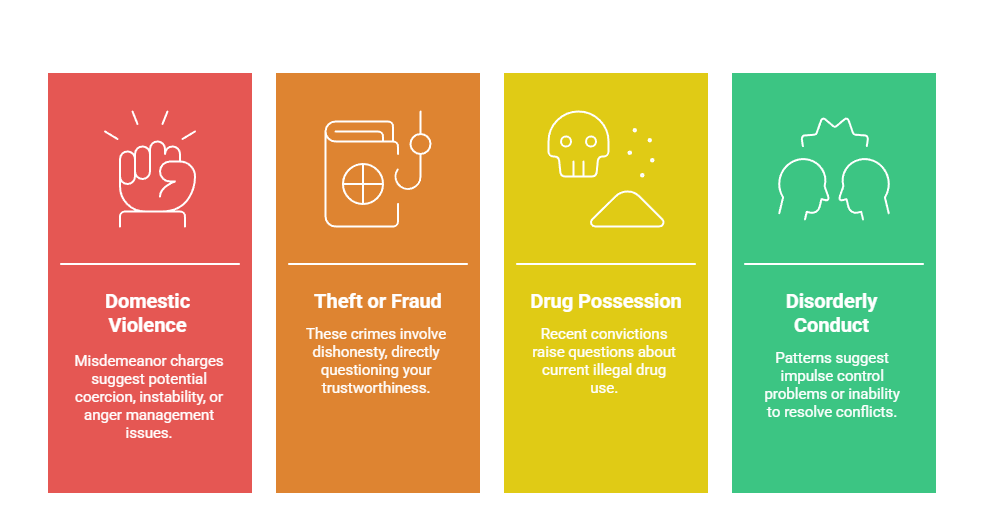
- Domestic violence incidents: Even misdemeanor charges suggest potential for coercion, instability, or anger management issues that pose security concerns.
- Theft or fraud-related offenses: These crimes involve dishonesty, directly questioning your trustworthiness regardless of conviction severity.
- Drug possession charges: Recent possession convictions raise questions about current illegal drug use and compliance with federal law.
- Disorderly conduct or assault: Patterns suggest impulse control problems or inability to resolve conflicts appropriately.
Successful mitigation requires specific actions. You must demonstrate the incident was isolated, acknowledge poor judgment, show concrete steps toward rehabilitation, and maintain a clean record since the offense.
Pending Charges and Ongoing Legal Issues
Pending criminal charges create immediate complications for background check approval. They represent unresolved questions about your conduct and judgment. Adjudicators typically cannot grant clearances when candidates face active charges, instead placing applications on hold until legal proceedings conclude.
Outstanding warrants, unpaid fines, incomplete probation, or failure to appear for court proceedings demonstrate disregard for legal obligations. These situations suggest you either don't take legal responsibilities seriously or are attempting to evade consequences. Both traits concern security clearance adjudicators.
Financial Problems and Credit Issues
Bankruptcy, Foreclosure, and Major Delinquencies
Financial difficulties don't automatically disqualify government contractor candidates. However, they require explanation because financial vulnerability creates potential for bribery, coercion, or exploitation. Adjudicators evaluate whether your financial problems resulted from circumstances beyond your control or from irresponsible behavior.
Medical emergencies, divorce, or job loss differ from excessive spending, gambling, or ignoring obligations. The distinction between unfortunate circumstances and financial irresponsibility significantly impacts clearance decisions. Bankruptcy itself isn't necessarily disqualifying when it represents a responsible method for addressing overwhelming debt.
Chapter 7 bankruptcy filed after job loss, followed by employment stability and responsible credit management, demonstrates problem-solving rather than irresponsibility. Conversely, multiple bankruptcies or immediately accumulating new debt after bankruptcy raises significant concerns. Demonstrating financial responsibility through debt consolidation, credit counseling, or consistent payment plans significantly improves clearance prospects.
Judgments, Liens, and Tax Problems
Federal and state tax liens represent particularly serious concerns. They demonstrate failure to meet legal obligations to the government itself. Unpaid taxes suggest you don't comply with fundamental civic responsibilities, raising questions about whether you'll follow security protocols.
Tax problems often result from deliberate choices not to pay rather than inability to pay. This suggests poor judgment and disregard for legal requirements. Unresolved judgments and liens create similar concerns by demonstrating you either can't or won't meet financial obligations even after court proceedings.
Successful mitigation requires demonstrating specific actions:
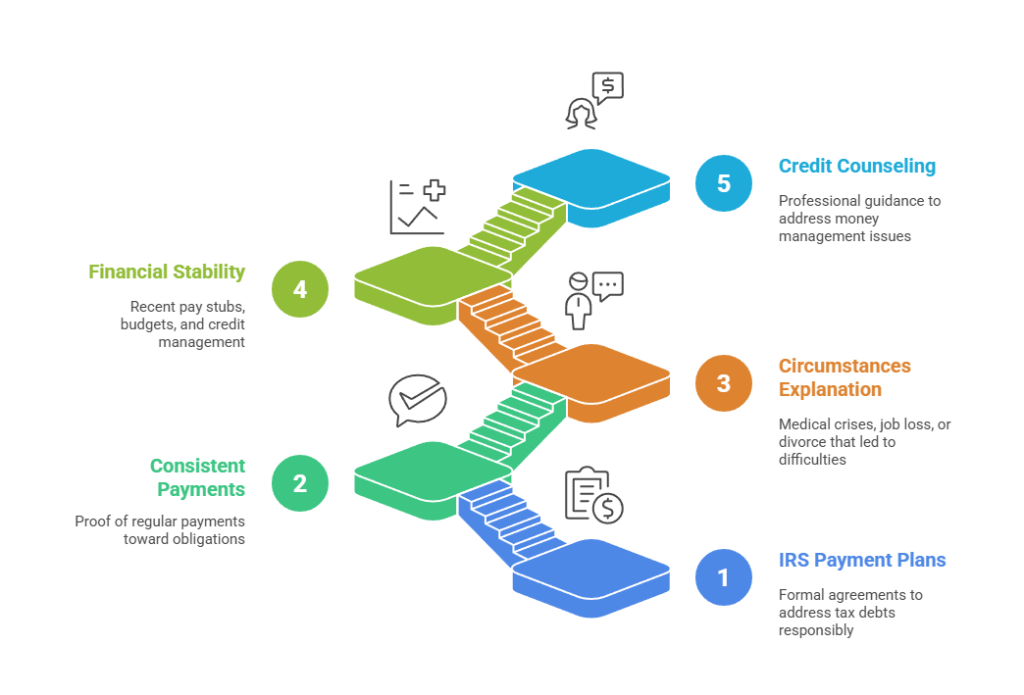
- Establishing IRS payment plans: Formal agreements showing you're addressing tax debts responsibly and making consistent payments.
- Providing documentation of consistent payments: Proof of regular payments toward judgments demonstrates commitment to resolving obligations.
- Showing circumstances that caused problems: Medical crises, job loss, or divorce that led to financial difficulties help adjudicators understand context.
- Demonstrating current financial stability: Recent pay stubs, budgets, and responsible credit management show you've regained control.
- Obtaining credit counseling assistance: Professional financial guidance demonstrates serious commitment to addressing money management issues.
Adjudicators understand that financial problems happen, but they need evidence that you're addressing issues responsibly rather than ignoring them or making excuses.
Can You Work for Government Contractors with Bad Credit?
Bad credit alone rarely disqualifies government contractor candidates. The exception is when it's accompanied by irresponsible behavior patterns or vulnerability to financial coercion. A low credit score resulting from medical debt, student loans, or past financial hardship differs significantly from poor credit caused by fraud or consistently living beyond your means.
Adjudicators focus on the reasons behind credit problems and your efforts to address them rather than the score itself. The crucial distinction involves financial responsibility versus financial irresponsibility. If your credit problems resulted from circumstances beyond your control and you're making reasonable efforts at resolution, most positions remain accessible.
Drug Use and Substance Abuse Concerns
Illegal Drug Use Timeline and Severity
Recent illegal drug use presents the most significant obstacle to government contractor clearance approval. "Recent" typically means within the past 12 months for marijuana and 24 months for other controlled substances. Federal law classifies marijuana as a Schedule I controlled substance regardless of state legalization.
Adjudicators evaluate drug use based on recency, frequency, type of drug, and circumstances surrounding use. Experimental drug use from college years generally presents fewer concerns than ongoing use into your 30s or 40s. A candidate who tried marijuana occasionally during college (5+ years ago) and stopped before entering the professional workforce demonstrates maturity and changed priorities.
The type and severity of drug involvement matters significantly. Marijuana experimentation from 5+ years ago usually can be mitigated with honest disclosure. Hard drug use like cocaine, methamphetamine, or heroin requires substantial mitigation period, typically 3-5 years, plus evidence of comprehensive lifestyle changes. Drug sales or distribution involvement creates severe obstacles requiring extensive time passage (7+ years) and exceptional mitigation.
Does Marijuana Use Disqualify Government Contractors?
Marijuana use doesn't automatically disqualify government contractors. However, recent use (typically within 12-24 months) creates significant challenges regardless of state legalization status. The federal government's position on marijuana remains unchanged despite state-level legalization—it's still a Schedule I controlled substance under federal law.
Adjudicators evaluate marijuana use with increasing nuance as societal attitudes shift. They still require demonstration that you can and will comply with federal law regardless of personal views on marijuana legalization. The key concerns involve judgment, willingness to follow rules you might disagree with, and whether continued use suggests vulnerability to pressure.
Factors that help mitigate marijuana use concerns include significant time since last use (2+ years preferred), infrequent rather than regular use patterns, use during youth rather than mature adulthood, immediate cessation once pursuing cleared employment, signed statements of intent to abstain from future use, and drug testing to verify abstinence. Candidates who used marijuana legally under state law but stopped immediately upon learning about federal clearance requirements demonstrate adaptability and rule compliance.
Alcohol-Related Incidents and Patterns
Alcohol use itself isn't disqualifying since it's legal. However, alcohol-related incidents or patterns of excessive consumption raise concerns about judgment, reliability, and potential vulnerability. DUI convictions, public intoxication arrests, alcohol-related workplace incidents, or alcohol-fueled violence suggest possible substance abuse problems.
A single DUI from several years ago with completed treatment and no subsequent alcohol issues typically won't prevent clearance approval. However, patterns of alcohol-related problems indicate deeper concerns. Multiple DUIs, arrests for public intoxication, domestic violence incidents involving alcohol, attendance problems due to hangovers, or diagnosed alcohol use disorder require substantial mitigation.
| Alcohol Issue | Typical Timeframe for Mitigation | Required Mitigation Steps |
| Single DUI (no injury) | 2-3 years | Completion of court requirements, alcohol assessment, no subsequent incidents |
| Multiple DUIs | 5+ years | Treatment completion, sustained sobriety, AA participation, lifestyle changes |
| Alcohol-related violence | 3-5 years | Anger management, treatment, pattern of changed behavior |
| Diagnosed alcohol use disorder | 3-5 years | Treatment completion, sustained recovery, sponsor support, continued monitoring |
Successful mitigation demonstrates sustained behavioral change rather than temporary compliance. Completing court-ordered treatment immediately after a DUI provides less assurance than voluntarily seeking treatment and maintaining sobriety for several years afterward.
Dishonesty and Falsification of Information
Why Lying on Background Checks Is More Serious Than Most Issues
Falsifying information on your security clearance application represents the most serious mistake you can make. It's often more disqualifying than the issue you're attempting to hide. Dishonesty directly undermines the fundamental requirement for security clearances: trustworthiness.
Adjudicators reason that if you're willing to lie to obtain clearance, you might be willing to compromise classified information for personal benefit. The SF-86 (Questionnaire for National Security Positions) explicitly warns that false statements can result in criminal prosecution under federal law. Beyond legal consequences, deliberate falsification almost always results in clearance denial, withdrawal of job offers, and potential debarment from future government contractor employment.
Common falsifications that result in denial include:
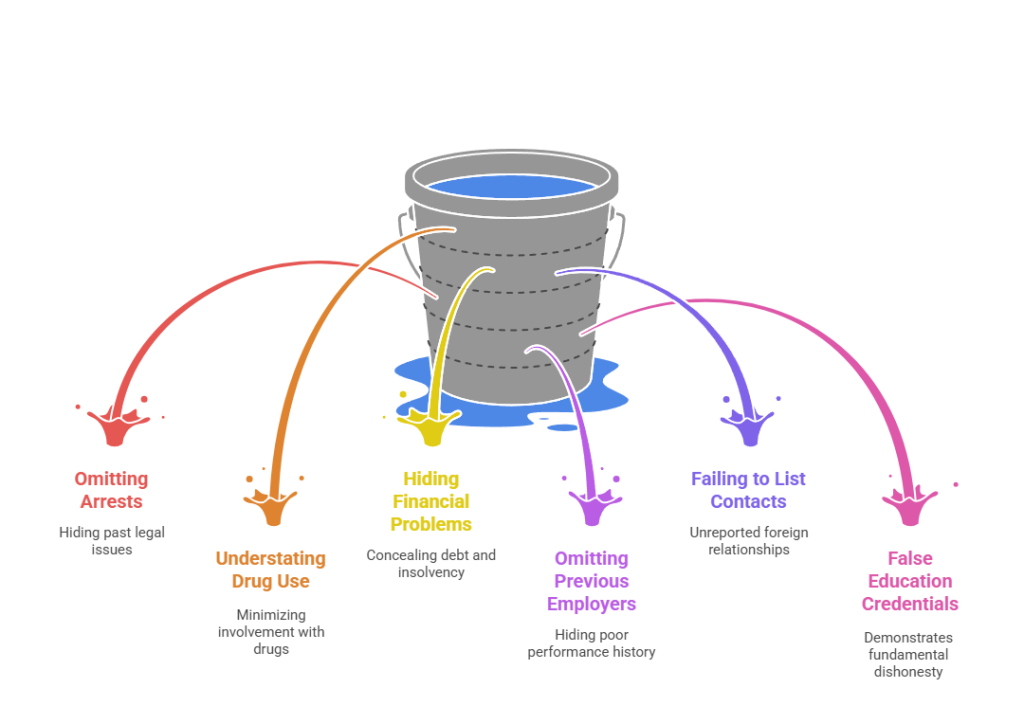
- Omitting criminal arrests or charges: Failing to disclose arrests, even if charges were dismissed or expunged, raises serious credibility concerns.
- Understating drug use frequency or recency: Minimizing how often or how recently you used drugs suggests you're hiding the full extent of involvement.
- Hiding financial problems: Failing to list bankruptcy, liens, foreclosures, or major delinquencies creates questions about what else you're concealing.
- Omitting previous employers: Not listing jobs where you were terminated suggests deliberate attempts to hide poor performance or conduct issues.
- Failing to list foreign contacts or travel: Unreported foreign relationships or international travel raises counterintelligence red flags.
- Providing false education credentials: Claiming degrees you didn't earn or inflating academic achievements demonstrates fundamental dishonesty.
Investigators are trained to uncover discrepancies and possess extensive resources for verification. They'll conduct interviews with references who may mention events you omitted, review court records, check credit reports, and compare your statements against previous applications.
The Importance of Complete Disclosure
Complete disclosure means reporting all information requested on your clearance application. This applies even when you're uncertain whether specific incidents qualify or fear they might cause denial. Borderline situations should always be disclosed with explanatory comments rather than omitted based on your interpretation of requirements.
Adjudicators would rather see over-reporting that demonstrates thoroughness and honesty than selective reporting suggesting you're hiding other information. When you're unsure whether to report something, apply this principle: if you're questioning whether to include it, include it. For example, if you're uncertain whether a dismissed charge should be reported, include it with an explanation that charges were dismissed.
Your background interview provides opportunity to clarify or elaborate on application information. Investigators expect nervous candidates might initially provide incomplete information and give chances to correct or expand on details. However, this opportunity for clarification differs significantly from being confronted with evidence contradicting your statements.
Employment History and Personal Conduct Red Flags
Terminations, Employment Gaps, and Pattern Issues
Employment terminations for cause raise concerns about reliability, trustworthiness, and ability to follow workplace rules. Being fired for attendance problems, policy violations, conflicts with supervisors, or performance issues suggests potential problems maintaining security protocols or working in sensitive environments. A single termination often won't disqualify you, particularly when you accept responsibility and demonstrate improved performance in subsequent positions.
Employment gaps themselves aren't disqualifying, but unexplained periods or inconsistent explanations create problems. Adjudicators understand that people experience unemployment, take time off for family reasons, or deal with health issues. However, gaps you attempt to hide, periods of incarceration you don't disclose, or frequent job-hopping suggesting instability do raise red flags.
Concerning employment patterns include frequent terminations (3+ jobs ending in firing), extensive unexplained gaps (6+ months without accounting), pattern of leaving jobs after short periods (multiple jobs lasting less than 6 months), and termination for security violations or policy breaches. Mitigating employment concerns requires accepting responsibility for past problems, explaining circumstances honestly, and demonstrating improved stability in recent positions.
Foreign Contacts, Travel, and Influence Concerns
Foreign contacts and travel aren't automatically problematic. However, they require disclosure and evaluation to determine whether they create vulnerability to foreign influence, coercion, or exploitation. Adjudicators examine whether foreign connections could pressure you to compromise classified information or whether your foreign ties suggest divided loyalties.
The specific countries involved significantly impact concern levels. Close allies like Canada or the United Kingdom raise fewer concerns than adversarial nations like Russia, China, Iran, or North Korea. Close relationships with foreign nationals—particularly immediate family members, romantic partners, or close friends in sensitive countries—require careful evaluation.
Foreign financial interests, including foreign bank accounts, property ownership, business interests, or foreign employment, create additional complications. While not automatically disqualifying, these connections require disclosure and explanation to determine whether they create potential conflicts of interest. Working to establish proper reporting of foreign accounts and interests demonstrates transparency that helps mitigate concerns.
What Happens If You Fail a Government Contractor Background Check

The Adjudication Process and Timeline
The security clearance adjudication process follows systematic evaluation procedures. These examine information gathered during your background investigation against 13 specific adjudicative guidelines. The guidelines cover areas including criminal conduct, financial considerations, drug involvement, personal conduct, and foreign influence.
Adjudicators don't apply automatic disqualifications for most issues. Instead, they evaluate the "whole person concept"—considering the nature and seriousness of conduct, circumstances surrounding conduct, frequency and recency, your age and maturity at the time, presence or absence of rehabilitation, and likelihood of recurrence. Timeline for clearance decisions varies significantly based on clearance level, investigation complexity, and current processing backlogs.
Basic Public Trust positions may process in 1-3 months. Secret clearances typically take 4-8 months. Top Secret clearances often require 8-18 months or longer when complications arise. Factors that extend timelines include extensive foreign contacts requiring overseas verification, complicated financial situations needing additional documentation, criminal records requiring court documents, or identified issues requiring additional investigation.
Appeal Rights and Reapplication Options
If your security clearance is denied, you have specific appeal rights. These depend on whether you're applying for a new clearance or facing revocation of existing clearance. For new applicants denied clearance, appeal options are limited—you typically cannot appeal the initial denial but can reapply after addressing the concerns.
The timeframe before reapplication varies by issue severity but typically ranges from 1-3 years for serious concerns. Current clearance holders facing revocation have more extensive appeal rights because revocation affects existing employment. You'll receive detailed notification of reasons for proposed revocation and have opportunity to submit written response.
Successful appeals or reapplications require demonstrating specific mitigation. This includes allowing sufficient time since problematic conduct, showing concrete actions taken to address underlying issues, providing documentation of treatment completion or rehabilitation efforts, acknowledging past mistakes without minimizing or blaming others, and demonstrating life changes that reduce vulnerability or security concerns. Many candidates successfully obtain clearances after initial denial by taking the denial seriously and addressing underlying issues thoroughly.
Can You Be a Government Contractor Without Clearance?
Many government contractor positions don't require security clearances at all. This provides employment opportunities even when clearance denial prevents access to classified work. Uncleared positions include administrative roles, IT support in unclassified environments, facilities management, basic technical positions, customer service roles, and various support functions.
These positions typically require basic background checks verifying identity, employment history, and criminal record. However, they don't involve the comprehensive security clearance process. Some government contractor employers offer "cleared" and "uncleared" tracks, allowing you to work in unclassified roles while addressing issues that prevent clearance approval.
How to Strengthen Your Background Check Application
Proactive Disclosure Strategies
Proactive disclosure means addressing potentially problematic issues head-on in your security clearance application. You avoid minimizing them or hoping investigators won't discover them. This approach demonstrates honesty, self-awareness, and understanding that adjudicators value forthrightness more than perfect backgrounds.
When disclosing concerning information, provide sufficient context and explanation without becoming defensive or making excuses. Focus on facts, accept responsibility, and highlight steps taken toward rehabilitation or resolution. For criminal issues, disclose all arrests and charges regardless of outcome, including dismissed charges, deferred adjudications, or expunged records.
Effective disclosure includes complete information, contextual explanation, evidence of mitigation, acceptance of responsibility, and current status clarification. Report all requested information without deciding something is "too old" or "doesn't count" based on your interpretation. Provide circumstances that help adjudicators understand the issue without making excuses. Include documentation of rehabilitation efforts, payment plans, or behavioral changes.
Documentation and Evidence That Helps
Supporting documentation strengthens your clearance application by providing objective evidence. This corroborates your statements and demonstrates mitigation efforts. While you shouldn't overwhelm adjudicators with excessive documentation, strategic evidence addressing specific concerns significantly improves approval chances.
Focus on documentation that shows time passage, rehabilitation, resolution of problems, or changed circumstances since problematic conduct occurred. For criminal issues, gather court records showing case outcomes and completed sentences, certificates of probation completion, rehabilitation program graduation certificates, character reference letters, and evidence of maintaining clean record since conviction.
| Issue Type | Helpful Documentation | Why It Matters |
| Criminal convictions | Probation completion certificates, rehabilitation program certificates, character references | Demonstrates sentence completion, rehabilitation efforts, and current good character |
| Financial problems | Payment plan agreements, proof of payments, credit counseling certificates | Shows proactive resolution efforts rather than ignoring debts |
| Drug/alcohol issues | Treatment completion certificates, drug test results, AA attendance records | Provides objective evidence of sobriety and commitment to remaining substance-free |
| Employment terminations | Performance reviews from subsequent jobs, recommendation letters, training certificates | Demonstrates improved performance and reliability since termination |
| Foreign contacts | Documentation of relationship nature, evidence of disclosed contacts per requirements | Shows transparency and appropriate management of foreign relationships |
When preparing documentation, organize it logically with clear explanations. Show what each document demonstrates and how it addresses specific concerns.
When Professional Help Makes Sense
Most security clearance applications don't require attorney or consultant assistance. The process is designed for candidates to complete independently with honest disclosure and appropriate documentation. However, certain circumstances benefit from professional guidance.
Consider professional assistance when facing multiple complex issues that interact (such as criminal convictions plus financial problems plus substance abuse). Also seek help when previous clearance was denied or revoked and you're seeking reconsideration, when dealing with particularly serious issues like espionage allegations, or when facing clearance revocation that threatens current employment. Security clearance attorneys and specialized consultants understand adjudicative guidelines and have experience with successful mitigation strategies.
Professional help is typically unnecessary for straightforward applications involving minor issues, single problems with clear mitigation, or first-time applications without significant concerns. The cost of security clearance attorneys ($150-$500+ per hour) and consultants ($2,000-$10,000+ for full representation) makes sense only when serious issues create substantial denial risk.
Conclusion
Government contractor background checks evaluate multiple aspects of your history to determine trustworthiness and security reliability. Most issues don't result in automatic disqualification when properly disclosed and mitigated. The adjudication process applies the "whole person concept" considering the nature and severity of conduct, time since occurrence, your age and maturity when issues occurred, and likelihood of recurrence. Remember that lying about issues creates more serious problems than the underlying conduct—adjudicators regularly approve candidates with significant past problems when those candidates are forthright and show genuine behavioral changes.
Frequently Asked Questions
What felonies automatically disqualify you from government contractor work?
No felonies create absolute automatic disqualification from all government contractor positions because adjudicators use the "whole person concept" to evaluate each case individually. However, espionage, treason, terrorism-related offenses, crimes against children, sexual violence, and national security violations create substantial obstacles requiring extensive mitigation. The key factors involve the crime's nature, time since conviction, evidence of rehabilitation, your age when offense occurred, and whether the conduct suggests ongoing security concerns. Many individuals with past felony convictions successfully obtain clearances by demonstrating significant time passage (typically 5-10+ years), completing all sentence requirements, maintaining clean records, and accepting full responsibility.
Can you work for a government contractor with bad credit?
Yes, you can work for government contractors with bad credit, but poor credit requires explanation and mitigation, particularly for positions requiring security clearances. Adjudicators evaluate the reasons behind credit problems rather than focusing solely on credit scores—financial difficulties from medical emergencies, job loss, divorce, or circumstances beyond your control raise fewer concerns than irresponsible spending or ignoring obligations. Successfully mitigating credit concerns requires establishing payment plans with creditors, demonstrating consistent efforts toward debt resolution, providing documentation of circumstances that caused financial hardship, obtaining financial counseling, and showing current financial stability even if past debts remain.
Does marijuana use disqualify government contractors?
Marijuana use doesn't automatically disqualify government contractors, but recent use (typically within 12-24 months) creates significant obstacles to security clearance approval regardless of state legalization because marijuana remains a Schedule I controlled substance under federal law. Experimental marijuana use from several years ago, particularly during college years, generally won't prevent clearance approval when honestly disclosed. Many candidates successfully obtain clearances despite past marijuana use by providing complete honest disclosure, demonstrating clear cessation once pursuing cleared employment, showing understanding that they must comply with federal law regardless of state statutes, and often submitting to drug testing to verify current abstinence.
What happens if you fail a government contractor background check?
If you fail a government contractor background check, you'll receive written notification detailing the specific security concerns that led to denial, allowing you to understand what issues need addressing before future applications. For new clearance applications, you typically cannot appeal the initial denial but can reapply after addressing underlying concerns and allowing sufficient time for mitigation (usually 1-3 years depending on issue severity). Successful reapplication requires demonstrating concrete mitigation through time passage since problematic conduct, behavioral changes addressing underlying issues, rehabilitation evidence such as treatment completion or financial counseling, acceptance of responsibility for past mistakes, and documentation of changed circumstances. Many candidates eventually obtain clearances after initial denial by taking the feedback seriously and thoroughly addressing identified issues.
Can you be a government contractor with a DUI?
Yes, you can be a government contractor with a DUI conviction—a single DUI typically won't prevent clearance approval when properly mitigated and sufficient time has passed. Adjudicators evaluate DUI convictions considering how long ago the offense occurred (2-3 years passage helps significantly), whether you completed all court requirements including treatment programs, whether subsequent alcohol-related incidents occurred, and what steps you've taken to address alcohol use since conviction. A single DUI from five years ago with completed probation, alcohol assessment, and no subsequent alcohol incidents usually won't disqualify you, but multiple DUIs or recent convictions create more serious concerns requiring substantial mitigation.
Do misdemeanors show up on government contractor background checks?
Yes, misdemeanor convictions show up on government contractor background checks because investigators examine comprehensive criminal history including arrests, charges, and convictions regardless of severity. You must disclose all criminal history on security clearance applications, including misdemeanor convictions, even when charges were dismissed, reduced from felonies, or occurred many years ago. Misdemeanors generally create fewer obstacles than felonies, but domestic violence, theft or fraud-related offenses, drug possession, and crimes involving dishonesty all question trustworthiness. The most important factor involves honest disclosure—failing to report misdemeanors because you assume they won't appear or don't count creates far more serious problems than the underlying offenses.
How long does it take to get security clearance for government contractors?
Security clearance timelines for government contractors vary significantly based on clearance level, investigation complexity, and current processing backlogs, typically ranging from 1-3 months for basic Public Trust positions to 8-18 months or longer for Top Secret clearances. Secret clearance investigations average 4-8 months under normal circumstances, while Top Secret clearances requiring Single Scope Background Investigations often take 8-18 months or more when complications arise. You can help expedite the process by submitting complete, accurate applications with all requested information, providing comprehensive contact information for all references, responding promptly to investigator requests, ensuring references respond when contacted, and organizing supporting documentation to address any anticipated concerns.
What disqualifies you from Top Secret clearance?
Top Secret clearance disqualification typically results from issues demonstrating significant security concerns that aren't adequately mitigated, including recent serious criminal conduct, substantial unresolved financial problems creating vulnerability to coercion, current illegal drug use or recent drug involvement, deliberate falsification of clearance applications, significant foreign influence or foreign preference concerns, or patterns of behavior suggesting poor judgment. While no single issue creates automatic disqualification, Top Secret clearances require more stringent evaluation than lower clearance levels because they grant access to information that could cause "exceptionally grave damage" to national security if disclosed. Issues that might be mitigated for Secret clearance often require more substantial mitigation for Top Secret clearance, including longer time passage since problematic conduct, more comprehensive evidence of rehabilitation, and stronger demonstration of changed circumstances.
Additional Resources
- Security Executive Agent Directive 4: National Security Adjudicative Guidelines
https://www.dni.gov/index.php/ncsc-how-we-work/ncsc-security-enterprise/security-executive-agent-directive-4 - Defense Counterintelligence and Security Agency: Security Clearance Process
https://www.dcsa.mil/is/security-clearance-process/ - SF-86: Questionnaire for National Security Positions
https://www.opm.gov/forms/pdf_fill/sf86.pdf - ClearanceJobs: Security Clearance Information and Resources
https://news.clearancejobs.com/ - Defense Office of Hearings and Appeals: Security Clearance Decisions Database
https://www.dod.mil/dodgc/doha/industrial/

GCheck Editorial Team
Meet the GCheck Editorial Team, your trusted source for insightful and up-to-date information in the world of employment background checks. Committed to delivering the latest trends, best practices, and industry insights, our team is dedicated to keeping you informed.
With a passion for ensuring accuracy, compliance, and efficiency in background screening, we are your go-to experts in the field. Stay tuned for our comprehensive articles, guides, and analysis, designed to empower businesses and individuals with the knowledge they need to make informed decisions.
At GCheck, we're here to guide you through the complexities of background checks, every step of the way.





